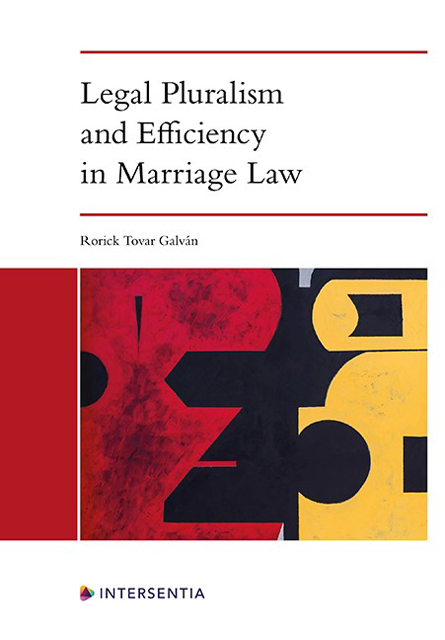Book contents
- Frontmatter
- Dedication
- Miscellaneous Frontmatter
- Foreword
- Preface
- Acknowledgments
- Contents
- List of Cases
- Introduction: Uncertainty and Inconsistency Surrounding the Determination of the Applicable Law in the EU Instruments on Matrimonial Issues
- Part I Economics As A Point Of Departure To Explain The Substantive Rules On Matrimonial Issues
- PART II Economics as a Point of Departure to Build a System of Conflict of Laws For Matrimonial Issues
- Conclusion: Certainty, Precision, Coherence, and Simplicity in the Determination of the Applicable Law
- Bibliography
- Index
- About the Author
Foreword
Published online by Cambridge University Press: 17 December 2022
- Frontmatter
- Dedication
- Miscellaneous Frontmatter
- Foreword
- Preface
- Acknowledgments
- Contents
- List of Cases
- Introduction: Uncertainty and Inconsistency Surrounding the Determination of the Applicable Law in the EU Instruments on Matrimonial Issues
- Part I Economics As A Point Of Departure To Explain The Substantive Rules On Matrimonial Issues
- PART II Economics as a Point of Departure to Build a System of Conflict of Laws For Matrimonial Issues
- Conclusion: Certainty, Precision, Coherence, and Simplicity in the Determination of the Applicable Law
- Bibliography
- Index
- About the Author
Summary
This book is dealing with a very interesting and important topic: the law applicable to a marriage with cross-border elements. The relevant international (including European) instruments as well domestic private international law rules dealing with specific aspects of a marriage (matrimonial property/maintenance/divorce) often lead to the applicability of different laws to different elements of the relationship. This dépeçage (splitting up the choice of law/ Zersplitterung) sometimes causes legal problems and nearly always causes practical problems. This is very irritating for the (ex)spouses concerned and is highly problematic inlight of legal certainty. (Ex)spouses will need highly specialized legal assistance in order to know precisely which legal system governs which area of their relationship. These difficulties are very well described and illustrated in this book. From my own experience, I can also say that even professors of private international law married with a foreign spouse have difficulties to determine precisely which law applies to which elements of their own marital relationship. The author of this book, Rorick Tovar Galván, who moved from Peru to Spain and later to Switzerland and got married in Switzerland before being naturalized there, has his own experiences with the uncertainty caused by splitting up the law applicable to the various aspects of his marriage.
It is a good decision that the book focuses on the three mentioned aspects of a marital relationship (matrimonial property/maintenance/divorce) and excludes, for example, the validity of the marriage as such, the effects on family names or the personal effects of the marital relationship. The three issues chosen are governed by instruments developed by, respectively relevant for Member States of European Union (the Hague Protocol of 23 November 2007 on the Law Applicable to Maintenance Obligations; Council Regulation (EU) No 1259/2010 of 20 December 2010 implementing enhanced cooperation in the area of the law applicable to divorce and legal separation; Council Regulation (EU) 2016/1103 of 24 June 2016 implementing enhanced cooperation in the area of jurisdiction, applicable law and the recognition and enforcement of decisions in matters of matrimonial property regimes).
- Type
- Chapter
- Information
- Legal Pluralism and Efficiency in Marriage Law , pp. vii - xPublisher: IntersentiaPrint publication year: 2022



